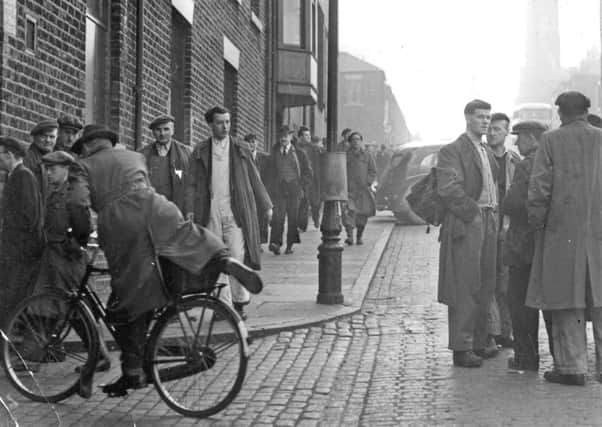Protecting South Tyneside port and workers' jobs


So it would have been comforting to later learn that their employer, the Tyne Improvement Commission (predecessor of the Port Of Tyne), decided to, not only guarantee their pay, but also their jobs – provided they returned from the conflict.
Thanks to the Port Of Tyne, who have kindly supplied details of board minutes, dated September 10, 1914, and more, we can get a sense of what life was like on the home-front as far as this crucial industry was concerned at the outset of the First World War.
Advertisement
Hide AdAdvertisement
Hide AdBoard members heard that: “a large number of the Commissioner’s officials and employees had been called up for active naval or military service, and many more enlisted.
“The board agreed, from the onset, to continue to pay all employees during active service, in addition to the Government allowances, and made a commitment to guarantee reinstatement on their return.”
In the same board meeting much was discussed regarding the defences of the Port of Tyne, and the request made from the War Office on July 29, 1914, to carefully examine every aspect of the port’s defences.
It is recorded that the Commissioners began their inspection on August 1 by making the Harbour Master the Chief Examining officer, and at the disposal of the military authorities.
Advertisement
Hide AdAdvertisement
Hide Ad“Torpedo nets, supplied by the Government, were at the instance of the military authorities, on the night of July 29, placed in readiness in position in front of the Northumberland and Albert Edward Dock Gates.
“Moorings were cleared of 45 vessels and made ready for the reception of warships – in many cases there were already no crew on-board prevailing to conscription – it was no mean feat to clear a large amount of moorings within 24 hours – working day and night.”
On hearing this, the chairman noted: “It says a good deal for the staff of the Commission that that was possible.”
The Commissioner’s River Police, meanwhile, were tasked with patrolling the internal waterways of the port.
Advertisement
Hide AdAdvertisement
Hide AdAs a result of this “important work”, the Commissioners “engaged motor boats, as the River Police were also tasked with co-operating with the Customs Authorities in regard to inspecting a special form of clearance by all vessels leaving port.”
Other action involved the North Pier Light being screened, and the North and South Piers closed to the Public, as from July 30, 1914.
“The Commissioner’s Docks, Howdon yard and both piers had to be specially watched by men expressly employed by the Commissioner’s to undertake this watch-keeping job.
“Accommodation was provided on the Commissioner’s Dock Estate and at the South Pier works for the housing of soldiers who were detailed as guards.
Advertisement
Hide AdAdvertisement
Hide Ad“The Military Authorities took possession of buildings belonging to the Commissioners which were necessary for defensive measures.”
In the North Pier visitors book, which still survives today, there are a number of entries dated throughout the war documenting the many visits from the military organisations in connection with the installation of signals for the examination of vessels.
“At Bewick House, the port’s former Head Office building, opposite Central Station, in Newcastle, office accommodation was given to Captain Crawford, one of HRH Naval Transport Officers, and a clerk specially provided by the Commissioners.
“Also arrangements were made for the Commissioner’s boats to be made available as and when – day and night – for the transport of bodies and troops.”
Advertisement
Hide AdAdvertisement
Hide AdIn order to meet demands of the war “it was found to be necessary to keep Bewick House open, day and night for five weeks (from July 28, 1914) and divide the number of staff into three shifts for the purposes of expediting these matters.
“On leaving, having been ordered to take up transport duties in France, Captain Crawford wrote to the Commissioner’s General Manager Mr Manson, to thank him for his kindness and courtesy extended by all employees, especially during great pressure, adding that if he was ever able to return to Newcastle, how he would be privileged to renew his acquaintance with the Tyne Improvement Commission.”
At the outbreak of hostilities against the Germans, the Commissioner’s account at the bank was in credit to the extent of £57,229.
During the first month of the conflict, the weekly revenue of the port was £17,000, only £2,000 below average.
Advertisement
Hide AdAdvertisement
Hide Ad“Fortunately the Commissioners had large capital works in hand, and a tight hand was kept upon unnecessary expenses on materials and stores.
As a result, all employees were able to be kept on. This was achieved by adopting, as far as possible, shorter hours, rather than resorting to wholesale job cuts – something seen in many an organisation in 1914.
“By September 1914, four clerical staff in the General Manager’s office were called up, while 17 others had volunteered.
“Four members of the Traffic Manager’s Office had volunteered and one in Howdon Yard’s clerical staff. Among the Dock Master’s, Ferries and Harbour Master’s Office, 47 had been called up or enlisted, and in the Engineering Howdon and Coble Dene Yards and South Pier Works, 25 men went were enlisted – meaning that a total of 98 men from the Commission were serving their king and country within the first five weeks of the war.”
Their story continues tomorrow.